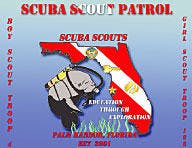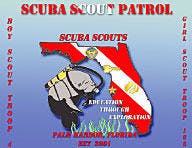Gulfstream Natural Gas Systems LLC (GNGS) is building a major natural gas pipeline in the Gulf of Mexico. Not satisfied with simply abiding by government regulations to minimize environmental impact during construction, GNGS went above and beyond the legal requirements of environmental protection to become the primary sponsor of a creative new subsea ecology program.
The environmental protection part involves compensatory mitigation for live-bottom impacts of the Gulfstream gas pipeline project.
The creative subsea ecology program part involves teenagers from Boy Scout Troop 4 and Girl Scout Troop 166 who participate in the Scuba Scouts program.
GNGS, a gas pipeline joint venture of operator Williams Cos. Inc., Tulsa, and energy marketer Duke Energy Corp., Charlotte, NC, began construction of the 700 mile, 36-in. natural gas pipeline from Mobile, Ala., to Manatee County, Fla., under stringent environmental protocols. One of those protocols involved compensatory mitigation for live-bottom impacts.
Simply put, environmental compensatory mitigation in this case means putting back more ecosystem habitat than that which is disrupted as a result of trenching and laying pipe.
Marine ecosystems
To protect fragile coral during subsea pipeline installation, divers must physically relocate coral formations, where necessary, from areas expected to be impacted by trenching.
GNGS, under the direction of environmental consultants, constructed shallow-water modules for compensatory mitigation for live-bottom impacts in the area in the form of habitat modules.
In state waters 5,000 tons of native Florida limestone were transported by barge to six mitigation areas in Tampa Bay. The six mitigation areas consist of 100 limestone modules, each measuring 20 ft by 24 ft, that form marine ecosystem habitats. Sessile invertebrates, mainly soft corals and sponges salvaged from areas of Tampa Bay that could have been impacted by construction, were reattached to rock and lowered in one of the six mitigation areas.
Based on a review of the bay, the modules were placed at specific sites that exhibited the greatest opportunity for ecological growth stimulation and the least likelihood of attracting marine life away from naturally established ecosystems.
The Florida Department of Environmental Protection, the National Marine Fisheries Service, Seabyte Inc., and the Florida Marine Research Institute (FMRI) worked to design and build equipment, supervise module installation, and devise monitoring and inspection procedures to ensure program success.
Above and beyond
GNGS, in cooperation with Scuba Scouts founder Dave Olsen, further enhanced the plan with an interrelated program combining science, nature, and teenagers.
The program, called Scuba Scout Patrol, offers a unique educational opportunity for 12 boys and girls from the Palm Harbor, Fla., area to understand the symbiotic relationship between natural habitats and artificial structures in a subsea environment.
According to Chris Stockton, director of communications at GNGS, during the next 2 years the scouts will, under the tutelage of FMRI's Walter Jaap, conduct underwater monitoring of the modules by using scientific methods for surveying and data collection, analysis, and management.
Prior to the Feb. 23 inaugural dive program sponsor GNGS outfitted the scouts with $10,000 worth of scuba gear, computers, underwater cameras, and monitoring equipment. Each scout obtained his or her scuba certification and learned underwater photography techniques.
"The scouts' endeavors will require repeated underwater surveying of the local habitat, living organisms, and other marine and biological parameters to determine their relative changes over time in their new environment," said Stockton. "Through this experience, the scout troop leaders hope the scouts will develop beneficial skills that will not only assist them in choosing careers, but also positively reinforce their respect and awe of the marine ecosystem."

